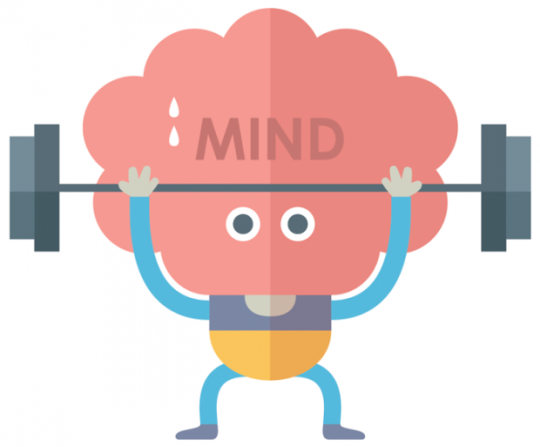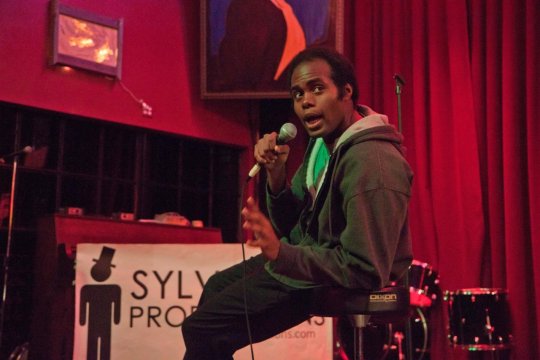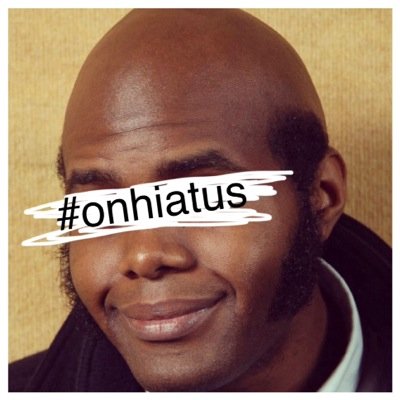I’ve never met Ian. I’ve seen him live handful of times, heard him on a few podcasts, read some articles about him, and, for all intents and purposes, I felt and still feel favorable towards Ian Karmel. But “meh”! What does it even mean? Was it even mean? So neutral and concise that I overanalyzed and internalized a single word from a notorious stranger. Was he brushing off my writing ability? Or was it that I was reporting to lose faith in the belief we once shared? “Meh” is so bluntly ambiguous. Or is it ambiguously blunt?
Q: Why did you quit comedy?
A: Depression!
— OJ Patterson (@OJPATTERSON)
“I quit comedy on July 7th 2014. It was glorious.” No it wasn’t. It was devastating. I thought, as a reaction to a new full-time job that exhausted my energy and eradicated my ability to host my beloved Storking Comedy as well as hit mics/showcases/far-away one-nighters with the gusto to get better, I should end my stand-up career, and, in turn, turn “stop joking” into a joke. It became my identity, I made memes; I even tried to establish a hashtag! Apparently the joke was extremely thin, one note. Not a lot of takers on the “I’m forgoing my dreams” shtick. Half of the people thought I was super serious, sending condolences like an athlete with a torn meniscus; others didn’t believe me at all, assuming that I’d be back. The rest just got bummed out. They missed me, as I them, but comedy would go on, as it does, regardless of who, when, and why somebody excuses themselves.
A year and change later: there’s a part of me that doesn’t regret quitting comedy, hence, words. I think I continue to live incomplete, for the same reason I embarked on the endeavor: I wanted to see if I could do it. I knew the lifestyle of going out most nights, hanging out at shows, trying to make my way up an invisible ladder to nowhere, letting my diluted creativity congeal into the crevices of a constricted schedule. I have a model for a metered output, doing sets every once in a while, opportunities given as a product of tenure. I hypothesized the abandon of cutting all ties to hunt prestige, living subhuman, hustling, grinding, comedy or bust. What I didn’t know, what I couldn’t imagine, what I was afraid of but inspired to take on, was the opposite, the inverse, the life unknown of love, comfort and sustainability. I didn’t want to be limited by fear, I didn’t want my obsession of comedy to handicap or sabotage my perceived self worth. I wanted to learn myself freely… and learn I did!
Now, truthfully, there’s a full concession that this could just be blowing smoke, an attempt to enable a masochistic stubbornness. This risks being completely self-serving, weightless delusion with a false humility reduction. This is probably more catharsis than advocating caution, elaborating causality or reaching a satisfying conclusion. This could be meh, or it could be meh. I mean, come on, this is a comedy website, not a diary. And what’s with “424″? That’s not a proper anniversary? I know, doubtful brain-demons, I know. Bear with me.
Lesson 1: Therapy is Awesome. Meditation is Dope. Medication is “meh”.
Mel, my loving girlfriend, noticed something was wrong when I started lying in my bedroom before the sun went down, crying my eyes out and waiting for sleep. Apparently, removing my primary source of communication, socializing, and expression, had rendered me into an erratic husk. “Maybe you should see someone,” she inquired. Tepid nod, more tears. I reached out for advice from anyone within reach of Twitter and Facebook because desperation plays well on the Internet. There was a lot of feedback, phone numbers and referrals; other comedians helped in the process, took the piss out of it, made it relatable. Doesn’t mean it was immediately incorporated. Asking for help is a motherfucker, especially if you perceive it as conditional or weak or futile or shameful or unworthy of. But, three months after quitting comedy, I felt worse than I ever had before; it was no time for pride or procrastination.
I went to my primary physician first, took a “I’m sad” test, got a script for Citalopram. The upcycle and downcycle is about two weeks; in between those bookends I felt…different. I was able to move forward against waves of debilitating sadness. Not happy, functional. I stopped taking them when I realized I couldn’t experience feeling better than “all right”, even while perceiving things as “hella good”. “Meh”, if you will. Also, I kept forgetting to take them.
With a lifetime of intense, bottled shame, loathing, habitually dismissed needs and overcompensating overshares, I’ve been prepping for therapy my whole life. My dude’s name is Paul. We do body scans, parts work, and he’s let me borrow a book that was like, “be mindful, even when you’re taking a shit”. I call him my “mental health personal trainer”, because whether I’m hovering in a difficult sense memory, or I’m envisioning self-compassion, it’s a work out.

Around this time, I read Grantland’s Eric Andre piece mentioning Headspace, a mobile app that tracks and teaches meditation without hippy-spiritual overtones. Very structured, very easy, guided projections from the far reaches of outer space, to envisioning who/what you appreciate most. The principles become second nature, the practice expects discipline, the results can feel euphoric.
Meds, therapy, meditation: desperate Allies in the war against depression. All saved my life. Meds were definitely Russia.
Lesson 2: Perspective Needs Distance.
Anything too close is distracting at best, overwhelming at worst. I remember being naked (except for one sock), bawling my eyes out reading people’s “I got into Bridgetown” social media statuses, while refreshing my auto-renewing mail client. I was too close. I wanted it too bad. “It” being a vague and overzealous desire for allowance, permission to feel good, go places, be recognized.
Away from stand-up, I can see the little things in the big things, recognize myself in the mess. A lot of people fault peer comparisons as what sours your own progress. That’s true. But I’ve learned to be present, especially in my introspection, to recognize nuances in delusion, defense mechanisms, and wasted energy, that’s there’s positivity in neutrality, even in negativity. Boundaries, motherfucker! Boundaries!
I don’t want to handshake everyone as a rule. I don’t want to envy my friends on a similar-yet-dissimilar track. I don’t want to socialize out of panic, or put people on pedestals, feel left out or left behind. I’m newfound and unabashedly sensitive. I’m like a Kirby of energy, of vibes. Introduced in 1992, Kirby is a video game character known for sucking in enemies and spitting out stars, like an adorable black hole. In the process, Kirby can take on the traits of its prey. It’s admittedly convoluted—and that this analogy is a bit of a stretch—but I’m INFJ, a protector, which can expose myself to a lot of standup culture’s pernicious radiation.
There’s a lot of amorality and compromise in the collective bargaining of chasing sets. A lot of toxic opinions, gossip and baseless advice to strip away your tread. To quote the late, great Patrice O’Neal, “show business is a fucked up business.” It’s unfortunate and uncomfortable to act against all of that, the machinery, when you’re trying your hardest to assimilate, a cyborg if not android.
Now I only do what I really want, which, coincidently, doesn’t require systematic approval. Super Trashed Bros is a chance to collaborate and spend time with my high school best friend. Courting Comedy is the most rewarding thing I’ve done (usually in my underwear). That’s all I need for now. And when I return to stand-up—yeah, I’ve always anticipated an eventual return, even if it’s another 424 days away—I’ll be able to see things for what they are, in relation to where I’m going and act accordingly.
Lesson 3: Having Fun is Fun!
There is a seemingly “jaded, unrepentant disillusionment” tone that I didn’t intend with this journal. Comedy isn’t all bad. For the most part I really enjoyed myself, met some of my closest friends, and laughed harder and longer than any other facet of my life. Onstage, offstage, comedians are, on average, my favorite people and hanging out with them fills me with feels. Unfortunately at the detriment of everything else.
Performing was a great excuse to get out of unwanted obligations, but cuts deep the other way. I’ve lost precious time with friends and family. Going away parties were abandoned. I left my mother’s birthday party mid-meal for ten minutes at Club 355. Worst part of it was neither place got my full attention, both sides suffered. Either I was checking my watch, waiting to move to another obligation or lamenting in FOMO. Nothing had a chance: every function, comedic or civilian, was judged by where I wasn’t. Plus, I was often using my presence as a bargaining chip, spending time so others would feel encouraged to see me perform, increase my bringer capacity. It’s fucking sad to admit that.
Didn’t help that comedy has a stringent principle equating quantity with quality. You feel—and are sometimes told—that, in order to get good, achieve goals, earn invitation, be taken seriously, you have to go up, you have to do sets, you have to perform. Nights in are an affront, vacations better have a guest spot on the itinerary, don’t even think of taking time off. If doing comedy is your passion, and doing comedy is as easy as going out much as possible, not doing comedy means your a bad comedian (e.g. a bad person).
And while that’s true, you’re probably a bad person, it shouldn’t be for having fun. There’s such a relief in not looking over your shoulder or cringing at the dangling weight of great expectations. Being a groomsman at a wedding is fun! Eating vegan Chinese food while cradling a terrier is fun! Netflix and chill in pillow forts is fun! Riffing on lunch dates with comedians is fun! Self care is fun! Boundaries are fun! Watching three days of wrestling in blistering hot Reseda is THE MOST FUN! My relationships have never been more fulfilling, more consistent, more effortless. My time has never felt more respected, more limitless, more full.
Lesson 4: I’m Still Funny!
Molly Schminkie, the Galadriel of San Francisco comedy, got the joke. Note: this is a secondary-sourced anecdote, spoken out of school, but, apparently I was up for an audition to get passed (i.e. work as a host) at Punch Line San Francisco, my home comedy club, one of the best in the country. Reportedly, Molly asked the person telling me this story, “what do you think of OJ?” “Oh, he quit comedy a couple months of ago,” responded my narrator. And Molly laughed. She laughed! Molly, who has walked among comedy giants, and, fostered a few herself, saw the bitter, hilarious irony of me, Mr. Courting Comedy, who hung out in the back on week nights, forgoing stage time to pay dues, who often hurdled onstage, performing the most ecstatic, unsafe, angular sets, who keeps the stub of his first night at the Sunday Showcase (7/11/2010) in his wallet, who, in therapy (with Paul), when asked to project my traumatized, vulnerable child-self, places him/me in the Punch Line, jumped ship RIGHT at the cusp of a huge, sweat-equity payoff! As far as jokes go, it may be my longest set-up with my most absurd punchline.

photo by Sam Ardrey.
I got into stand-up to tell jokes, because I thought I was funny. Over four and a half years I confirmed that notion. I left, partly, because the medium proved personally ineffective. Stand-up is not the only place I can be funny. Hilarity is amorphous, malleable; performing, for me, has facsimiles. I still get a charge from an impromptu witticism, connecting by listening, lobbing a perfect retort. Still feel proud if an observation lands with friends. Still perform bits with the aforementioned and lovely Mel. I still jot ideas and concepts in my inner-standup voice on newspapers and notebooks, still cynical and irreverent as fux, still curious if my brain’s frequencies wave with anyone else’s, still worry that if it’s all just “meh”. Fortunately, I don’t have to wait hours at bars to find that out. Drinks are cheaper at home. Audiences are more receptive too.
Lesson 5: Nothing Is Determined, Everything Is A Process, Stay Present.
I romanticize nonexistence. Adolescent days in isolation, journals of rants in Garfield notebooks, daydreaming about my funeral. I even painted a picture of it for a summer school art appreciation class (that I didn’t want to take). Note the tumble weed pyre invoking desertion. The fact I didn’t start therapy until a decade later is borderline child abuse!
This channeled my insecurities and anxieties of feeling unseen, disappointed and helpless, which have persisted with varying intensities my whole life. I gravitate to what makes me feel those emotions less, comedy being one of those things, but it didn’t “save” me from them. Quitting stand-up didn’t “save” me either.
The most important lesson is that there is no “saving”. I still suffer chemical, clinical depression, still desire to disappear or self-destruct, still forget about Dre. Thankfully, today, I have the tools, support, resources and clarity to acknowledge and embrace that. Life is life, and it’s happening all of the time. You can strive to change yours, but you can’t change you, or at least I can’t change me. All one can do is learn, remain open and aware, or, at least that’s where I’m at.
What do you think? Meh or meh? What have you learned inside or outside of doing comedy in the last year? Let me know in the comments and thanks for reading.
